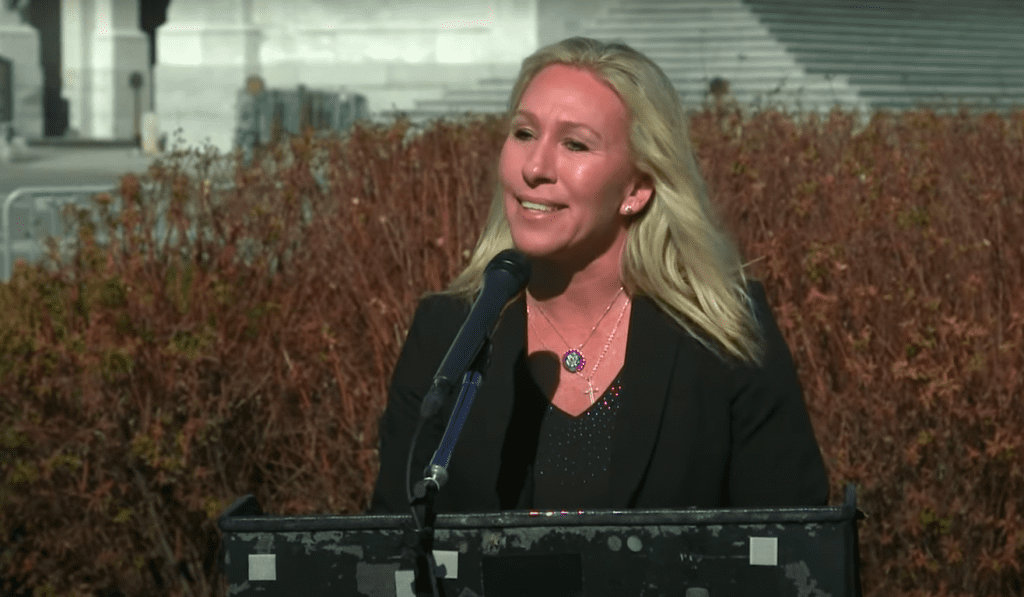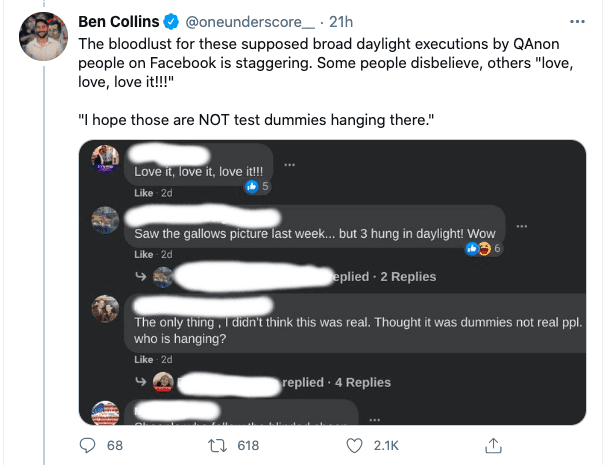The authoritarian, fundamentalist nature of certain evangelical strands is a prominent theme in the places where you see the most ardent Trump supporters or the QAnon believers, because they’ve been told: “You don’t need to study [scripture]. We’re giving you the answer.” Then, when Rev. Robert Jeffress [a prominent conservative Baptist pastor in Dallas] says you’ve got to support Donald Trump, and makes some argument that sounds “churchy,” people go, “Well, I don’t like Trump’s language, but OK, that’s the right thing.” It creates people who are not critical thinkers. They’re not necessarily reading scripture for themselves. Or if they are, they’re reading it through the lens of one pastor, and they’re not necessarily open to hearing outside perspectives on what the text might say. It creates groupthink.
How To Deal With The QAnon Qrazies?

Look at this:





Ben Collins is right. These people are dangerous. In 2017, a 28-year-old man pled guilty to invading a DC pizza parlor and firing three rounds from his AR-15 in response to his belief that the pizza parlor was at the center of a DC Democratic elite pedophile conspiracy. The QAnon cult did not exist at that time, but it absorbed the pizza conspiracy into itself.
We have just been through days of Capitol Hill drama over the status of Marjorie Taylor Green, a QAnon supporter who got herself elected to Congress. She is an Evangelical Christian, and promotes herself publicly as a Christian leader:
My message to Christians in this country. pic.twitter.com/VH6a18HkPR
— Marjorie Taylor Greene ?? (@mtgreenee) February 5, 2021
Three years ago, she wrote on social media that California wildfires may be caused by Jewish-owned space lasers. No, really, she did.
This week, the House, in a party line vote, kicked Greene off committees to punish her for her most outrageous statements, including twice endorsing the assassination of House Speaker Nancy Pelosi. (See that, and her other crackpot statements, here.) I agree with the House GOP that it sets a dangerous precedent for the party controlling the House to bar certain lawmakers from the opposition from holding committee assignments, but come on, the Republicans ought to have done this themselves. Greene gave a speech to House Republicans kinda sorta backing off from QAnon. If she’s serious, that’s great; she should have the chance to restore her reputation, but she needs to use her first term in Congress to show that she means it.
It is deeply worrying, though, that the Republican Party can’t bring itself to stand unambiguously against QAnon and its adjacent conspiracies. This poison cannot be mainstreamed into American political life. NPR interviewed a guy named Travis View, a podcaster who tracks QAnon and other conspiracy theories. Excerpt:
“They come to their conclusion first,” View says. “They decide what makes them feel best and then they construct conspiracy theories that help them convince themselves why that’s true.”
“It’s really kind of like an improvisational reality building,” he continues. “They don’t look to the outside world to try and figure out what is true and what is not, and as a consequence, sometimes have to face harsh truths such as the electoral victory of Joe Biden.
Last year, QAnon spread into the mainstream. As president, Trump repeatedly retweeted accounts tied to QAnon. Newly elected Republican Reps. Marjorie Taylor Greene and Lauren Boebert have spoken openly in support of QAnon.
A significant number of Americans say they believe in QAnon conspiracy theories, even after the election. A December NPR/Ipsos poll found that 17% of adults believe that “a group of Satan-worshipping elites who run a child sex ring are trying to control our politics and media” — a foundational falsehood for the QAnon community — while 37% said they didn’t know whether the baseless allegation was true or not.
Try to wrap your mind around that: over half of Americans believe that the Satanic cabal story is either true, or could be true.
This ought to set off alarms! As I write in Live Not By Lies, a nation prepares itself for totalitarianism by giving itself over to lies that make you feel good. Hannah Arendt wrote that in pre-totalitarian Germany and Russia, people hated the ruling elites so much that they were willing to believe any crazy thing for the sake of striking back at the people they believed oppressed them. When hating your enemies matters more than standing in truth, you have made a deal with the devil. In my book, I quote the memoir of Heda Margolius Kovály, a disillusioned Czech communist whose husband was executed after a 1952 show trial, in which the author reflects on the willingness of people to turn their backs on the truth for the sake of an ideological cause:
It is not hard for a totalitarian regime to keep people ignorant. Once you relinquish your freedom for the sake of “understood necessity,” for Party discipline, for conformity with the regime, for the greatness and glory of the Fatherland, or for any of the substitutes that are so convincingly offered, you cede your claim to the truth. Slowly, drop by drop, your life begins to ooze away just as surely as if you had slashed your wrists; you have voluntarily condemned yourself to helplessness.
If the Republican Party leadership — and the GOP followership — really believe that it’s important to tolerate QAnon devotees in their ranks because the Right has to stand united against the Left, they condemn themselves to helplessness when this QAnon monster devours the party.
Ben Collins shows that QAnon are not simply weirdos, but are indulging in bloodlust. Why is it so hard for Republicans to repudiate them, and everything they stand for? What are they going to do if, God forbid, one of these lunatics actually kills somebody?
Elizabeth Neumann, a former top Trump Administration Homeland Security official who resigned in April 2020, tells Politico that the church — she’s speaking of Evangelicalism, as an Evangelical — has to do a much better job of teaching and discipling its members, far too many of whom are susceptible to QAnon and related conspiracies. Excerpt:
Another factor is Christian nationalism. That’s a huge theme throughout evangelical Christendom. It’s subtle: Like, you had the Christian flag and the American flag at the front of the church, and if you went to a Christian school, you pledged allegiance to the Christian flag and the American flag. There was this merger that was always there when I was growing up. And it was really there for the generation ahead of me, in the ’50s and ’60s. Some people interpreted it as: Love of country and love of our faith are the same thing. And for others, there’s an actual explicit theology.
There was this whole movement in the ’90s and 2000s among conservatives to explain how amazing [America’s] founding was: Our founding was inspired by God, and there’s no explanation for how we won the Revolutionary War except God, and, by the way, did you know that the founders made this covenant with God? It’s American exceptionalism but goes beyond that. It says that we are the next version of Israel from the Old Testament, that we are God’s chosen nation, and that is a special covenant — a two-way agreement with God. We can’t break it, and if we do, what happened to Israel will happen to us: We will be overrun by whatever the next Babylon is, taken into captivity, and He will remove His blessing from us.
What [threatens] that covenant? The moment we started taking prayer out of [public] schools and allowing various changes in our culture — [the legalization of] abortion is one of those moments; gay marriage is another. They see it in cataclysmic terms: This is the moment, and God’s going to judge us. They view the last 50 years of moral decline as us breaking our covenant, and that because of that, God’s going to remove His blessing. When you paint it in existential terms like that, a lot of people feel justified to carry out acts of violence in the name of their faith.
The elections in 2016 and 2020 were a fight in existential terms for believers of this teaching — meaning, if we allow Hillary Clinton or Joe Biden to be president, they are going to put the nail in the coffin [of the covenant], and the next thing we’re going to see is that Christianity is going to be outlawed, pastors will not be able to teach the Bible and Christians will become persecuted.
Now, here’s the caveat: Some of that fear is not out of thin air. There is a real “cancel culture,” where you see a mob mentality swarm on somebody who holds a biblically based viewpoint on, say, gay marriage, and you see someone forced out of a position or lose sponsorships or advertising. But they follow that to what they think is a logical conclusion — that eventually, pastors will not be able to preach against homosexuality or abortion, and if [they do], they’re going to end up arrested and unable to preach. I’ve heard that argument made multiple times over the last 10 years. The irrationality is the idea that there are no protections, that the courts wouldn’t step in and say, “No, the First Amendment applies to Christians as well.”
It tries to assert that they are losing power and must regain that power by any means necessary — which is why you can justify voting for Trump, so that we can, for God’s purposes, maintain this Christian nation. But that’s nowhere in scripture. Scripture, when it talks about what “Israel” is in the New Testament, it explains that it’s the church — which is not owned by any one nation; it’s a global church. And even if somehow you wanted to say that the American church is what [scripture is] referencing, [the Bible] tells us [to do] the exact opposite of what they’re talking about. We are told not to seek power. We’re told to be humble. We’re told to turn the other cheek. Jesus, in confronting Caesar’s representative at his trial, says, “My kingdom is not of this world.” “My fight is not here,” basically. Our purpose as believers is to be salt and light; it’s not to force everybody else to hold our beliefs.
To fix that, you really have to go back to scripture. You can’t just be like, “Christian nationalism is wrong.” You have to go back to what the Bible says, versus what you were taught as an American Christian, where it was so interwoven. It took me a while to even discover it. Once somebody pointed it out, [I was] like, “Oh, my gosh. I was taught that, and you’re right, that’s not correct.”
But it’s a very hard thing for people to [address], because it requires acknowledging that how you were raised or the people that you trusted either intentionally lied to you or were just wrong. It’s hard. It takes humility to go there. It’s a hard thing for people to recognize and escape from. But sadly, it’s a security issue that we have to address, because it has led to this.
Well, I probably have less faith in the First Amendment than Neumann does, but she’s generally correct here. As a non-Evangelical, I am often startled by how tightly some conservative Evangelicals tie the Kingdom of God to the USA. Reading Neumann’s interview brought to mind how shocked I was back in the mid-1980s to drive by a Southern Baptist church here in Baton Rouge, and to see a howitzer placed on the front lawn, with the church sign advertising an upcoming patriotic talk by Lt. Col. Oliver North, of the Iran-Contra scandal. For the members of this congregation, American military aggression and conservative politics were inextricable from the Gospel.
I defer to my Evangelical readers to educate us on this matter. I don’t believe, though, that QAnon is just an Evangelical thing at all. The first time I heard about it from someone who believed it, the QAnon guy was Orthodox. There is nothing particular about Orthodox Christianity (or Catholicism) that would predispose someone to believing in QAnon, but I can certainly see how a theologically-infused hypernationalism would leave one open to radical conspiracies. Certainly the idea that the United States of America is analogous to Biblical Israel in terms of having a special covenant with God — something that does not exist in Catholicism or Orthodoxy — would make ordinary politics have apocalyptic ramifications.
Anyway, back to the Politico interview with Neumann:
It sounds like you’re describing a reality for some evangelical Christians where their church is based more in culture than scripture — and that this makes them more susceptible to things like QAnon?
Oh, absolutely. Here’s the thing, and I will do my best to explain it from a secular perspective: There’s text in the New Testament where the Apostle Paul is admonishing a church he helped establish: “You should be mature adults now in your faith, but I’m still having to feed you with milk.” He’s basically saying, you should be 18, but you’re still nursing, and we need you to get it together.
There was a big movement in the ’90s called Seeker-Friendly Churches. Willow Creek [one of the most prominent of these churches] did a self-assessment about 10 or 15 years ago, and one of the things that they found is while they had converted people to Christians, there was a lack of growth in their faith. They were not learning the scriptures. They were not engaged in community. They were not discipling anybody. And [Willow Creek’s] assessment was: We failed. We baptized some people, but they’re not actually maturing.
One of my questions is: Are we seeing in the last four years one of the consequences of that failure? They didn’t mature [in their faith], and they’re very easily led astray by what scripture calls “false teachers.” My thesis here is that if we had a more scripturally based set of believers in this country — if everybody who calls themselves a “Christian” had actually read through, I don’t know, 80 percent of the Bible — they would not have been so easily deceived.
I think she is spot on there, and not just about QAnon. There are other contemporary ideas and ideologies that too many Christians fall for because their churches have done such a poor job of discipling them. From The Benedict Option, this about the work of sociologist of religion Christian Smith:
As bleak as Christian Smith’s 2005 findings were, his follow-up research, a third installment of which was published in 2011, was even grimmer. Surveying the moral beliefs of 18-to-23-year-olds, Smith and his colleagues found that only 40 percent of young Christians surveyed said that their personal moral beliefs were grounded in the Bible or some other religious sensibility. Unfortunately, it’s unlikely that the beliefs of even these faithful are biblically coherent. Many of these “Christians” are actually committed moral individualists who neither know nor practice a coherent Bible-based morality.
An astonishing 61 percent of the emerging adults had no moral problem at all with materialism and consumerism. An added 30 percent expressed some qualms but figured it was not worth worrying about. In this view, say Smith and his team, “all that society is, apparently, is a collection of autonomous individuals out to enjoy life.”
To be clear, the 91 percent are not all self-identified Christians, but if only 40 percent of the Christians surveyed say their moral beliefs are grounded in the Bible or religion, it’s fair to say that the 91 percent number includes a huge number of 18-to-23-year-old Christians.
Those figures come from Smith’s 2011 book Lost In Transition. Here’s a segment from that section:

Marjorie Taylor Greene is a member of North Point Community Church, pastored by Andy Stanley. It is one of the biggest megachurches in America. It’s not fair to hold a pastor or a church responsible for everything said by one of its members, but it does call into question what kind of teaching and discipleship Marjorie Taylor Greene received in that church. I’m sure it’s not a QAnon church by any stretch, but is the kind of Christianity she received there the sort that would have given her some resilience against conspiracy theory? I’m not just picking on that church. I have heard from Orthodox friends telling me about QAnon in their own congregations. If our churches — Protestant, Catholic, Orthodox, whatever — are not teaching clearly, consistently, and strongly, in a countercultural way, then we should not be surprised when some of our people give themselves over to powerful ideologies, and try to incorporate them into Christianity.
After all, when Nazism came to the Blessed Franz Jägerstätter’s Austrian Alpine village, most everybody there attended Catholic mass, but the Jägerstätter family was the only one that resisted.
If we do not push back hard against extremist ideologies, we will find ourselves having to fight against totalitarianism. The Left has its Woke ideology, which is nuts, and has conquered many liberal institutions. The Right’s QAnon ideology is even crazier, but thankfully not as powerful. Still, we are called to live not by lies, period — not just progressive lies. The “no enemies to the Left” concept is destroying important institutions. As my colleague Curt Mills alludes to in a piece today, there is a chance that Rep. Greene’s enemies will make a martyr of her, and she will grow stronger. Still, the GOP cannot withstand adopting a “no enemies to the Right” mentality concerning QAnon.
UPDATE: Listen to this CSPAN qaller:
"We need women like [Marjorie Taylor-Greene] in there, otherwise these Democrats are gonna keep eating babies and cutting the faces off of them."https://t.co/zCxmLtcLN9 pic.twitter.com/LNAqlLSbV2
— Ben Collins (@oneunderscore__) February 4, 2021
UPDATE.2: News about Greene’s far-right militia campaign bodyguards:
The leader of a private paramilitary group that provided security for Rep. Marjorie Taylor Greene said he has formed alliances with other far-right groups to advocate for Georgia’s secession from the union, following the arrests of participants in the Jan. 6 insurrection at the U.S. Capitol.
“The way patriots are now being hunted down and arrested by fellow men and women who have taken the same oath has disheartened any faith I had in the redemption or reformation of the USA as one entity,” Justin Thayer, head of the Georgia III% Martyrs, said in a text exchange with The Atlanta Journal-Constitution this week.
Thayer said the Martyrs have allied themselves with fellow “Three Percenter” militia the American Brotherhood of Patriots and American Patriots USA (APUSA), a north Georgia group headed by Chester Doles, a Dahlonega resident who belonged to various racist and neo-Nazi hate groups before forming the new group in 2019. The combined groups will advocate for Georgia’s secession from the union through an amendment to the U.S. Constitution or through “the collapse of the American experiment,” Thayer said.
“For the last 150 years, the Imperial Yankee culture of the northeast has been molding Georgia — and the South in general — into its ‘perfect’ image,” he said.
Donate to The American Conservative Today
This is not a paywall!
Your support helps us continue our mission of providing thoughtful, independent journalism. With your contribution, we can maintain our commitment to principled reporting on the issues that matter most.
Donate Today: